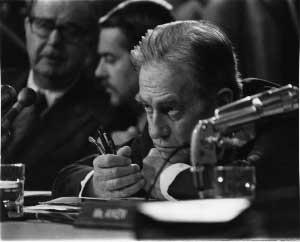Like many Americans, Senator Clifford Case was clearly disturbed both by Richard Nixon's decision to expand the Vietnam War, despite campaign promises to begin drawing the conflict to a close, and the level of secrecy associated with the president's actions. Nixon had assured the American public that the policy of Vietnamization was underway and successfully transitioning responsibility for the prosecution of the war to the Vietnamese. As the war dragged on, it appeared that de-escalation was not proceeding as promised. Case had already made his viewpoints on the war evident. While he hesitated to question the United States' role and objectives in Vietnam, he did not shy away from critiquing the executive's lack of communication with the public regarding the de-escalation of the war and the establishment of a clear timeline for withdrawal of American troops.
Please read through one of the versions of the speech given by Clifford Case on the CIA and the Case Act and respond to the following questions.

Kissinger Hearing, Foreign Relations Committee; September, 1973
- In your own words, summarize Clifford Case's concerns and demands as expressed in his speech.
- Based on your understanding of what was occurring in Southeast Asia at the time Clifford Case delivered this speech, do you believe that Case's demands were reasonable?
- Using textual evidence from the Constitution:
- Did the president overstep his constitutional authority?
- Were Clifford Case's requests within the realm of Congress' powers?
- In your opinion, should Case have included additional provisions in his legislation? Provide specific examples to support your conclusions.
Links to Documents
- Link to Congressional Record Speech on June 21, 1971. View now or open the PDF version (0.8MB)
- Link to the Congressional Record Speech and Text of Case Act on July 12, 1971. View now or open the PDF version (2.2MB)>
Activity II — Should Presidents Keep Secrets?
- Do Now: At the beginning of the class session provide students with the following questions:
- When is it acceptable to keep secrets?
- What type of information should be kept secret?
- Can the secrecy associated with information ever expire? What conditions
- Have students share their responses with the class while you record their responses. Ideally they will be recorded in a location where all students can see the unique list being developed by the class.
- Provide students with the materials for this activity if they do not have access to Electronic New Jersey
- When arriving at the page, students will see the following text, prompt, and questions
Like many Americans, Senator Clifford Case was clearly disturbed both by Richard Nixon's decision to expand the Vietnam War, despite campaign promises to begin drawing the conflict to a close, and the level of secrecy associated with the president's actions. Case had already made his viewpoints on the war evident. While he hesitated to question the United States' role and objectives in Vietnam, he did not shy away from critiquing the executive's lack of communication with the public regarding the de-escalation of the war and the establishment of a clear timeline for withdrawal of American troops.Please read through one of the versions of the speech given by Clifford Case on the CIA and the Case Act and respond to the following questions.
- In your own words, summarize Clifford Case's concerns and demands as expressed in his speech.
- Based on your understanding of what was occurring in Southeast Asia at the time Clifford Case delivered this speech, do you believe that Case's demands were reasonable?
- Using textual evidence from the Constitution:
- Did the president overstep his constitutional authority?
- Were Clifford Case's requests within the realm of Congress' powers?
- In your opinion, should Case have included additional provisions in his legislation? Provide specific examples to support your conclusions.
- In order to understand the context of the documents associated with this activity, students must be aware of the Vietnam War during Nixon's presidency, especially his decision to extend the bombing campaign into other nations in Southeast Asia without informing Congress or the public. The teacher may wish to compare and contrast the concepts of Americanization and Vietnamization. In particular, the students must understand the relationship between the executive, the CIA, and funding for these missions. Several options exist for enriching this discussion
- Students can be instructed to research the structure and mission of the CIA independently or in small groups.
- Students can be assigned examples of covert operations conducted by the CIA throughout history and the degree to which the American public knew about these actions as well as their reactions. The students can then share their findings with the class.
- Provide students with/direct students to the following documents:
- Remarks from the Congressional Record by Clifford Case on June 21, 1971 titled "Increased Congressional Control Over CIA"
- Remarks from the Congressional Record by Clifford Case on July 12, 1971 titled "Notice to Congress of Foreign Military or Economic Assistance Transfers."
(This document is quite similar to the speech given on June 21. Case reiterated many of his ideas on July 12 and also asked that the text of his proposed bill be included in the Congressional Record. This document is more suitable if you wish to work with the legislation as well as Case's commentary. You are encouraged to read both so that references can be made to the actual legislation put forth by Case.)